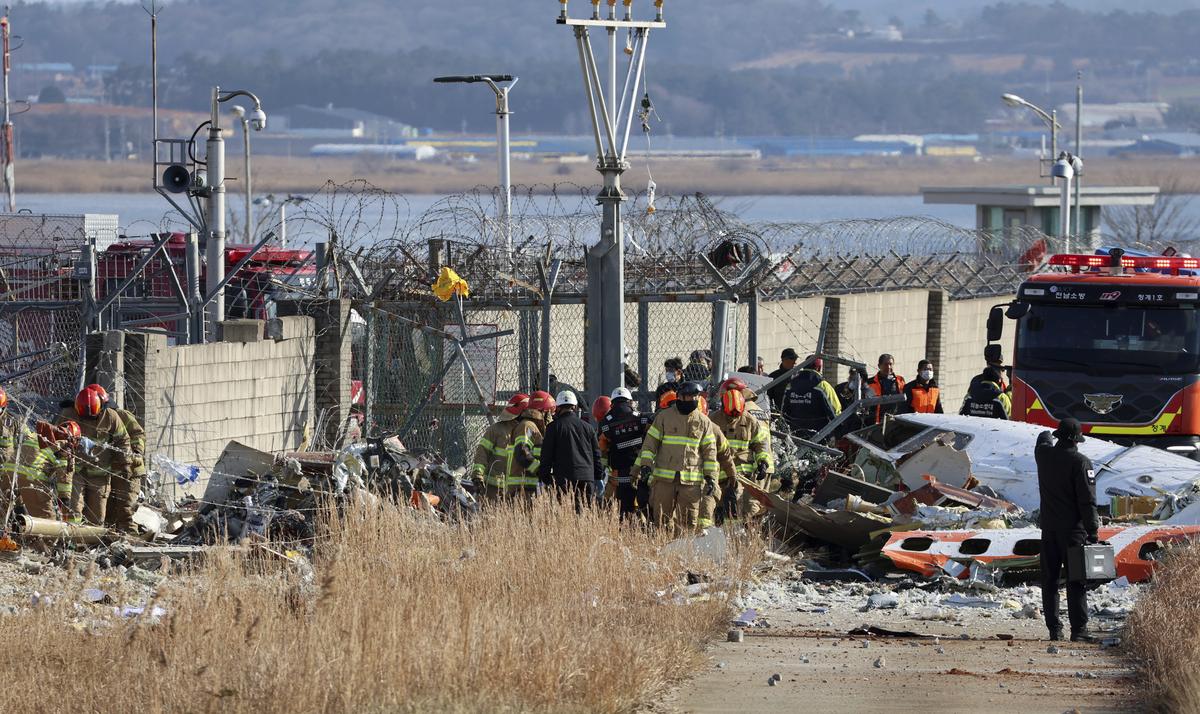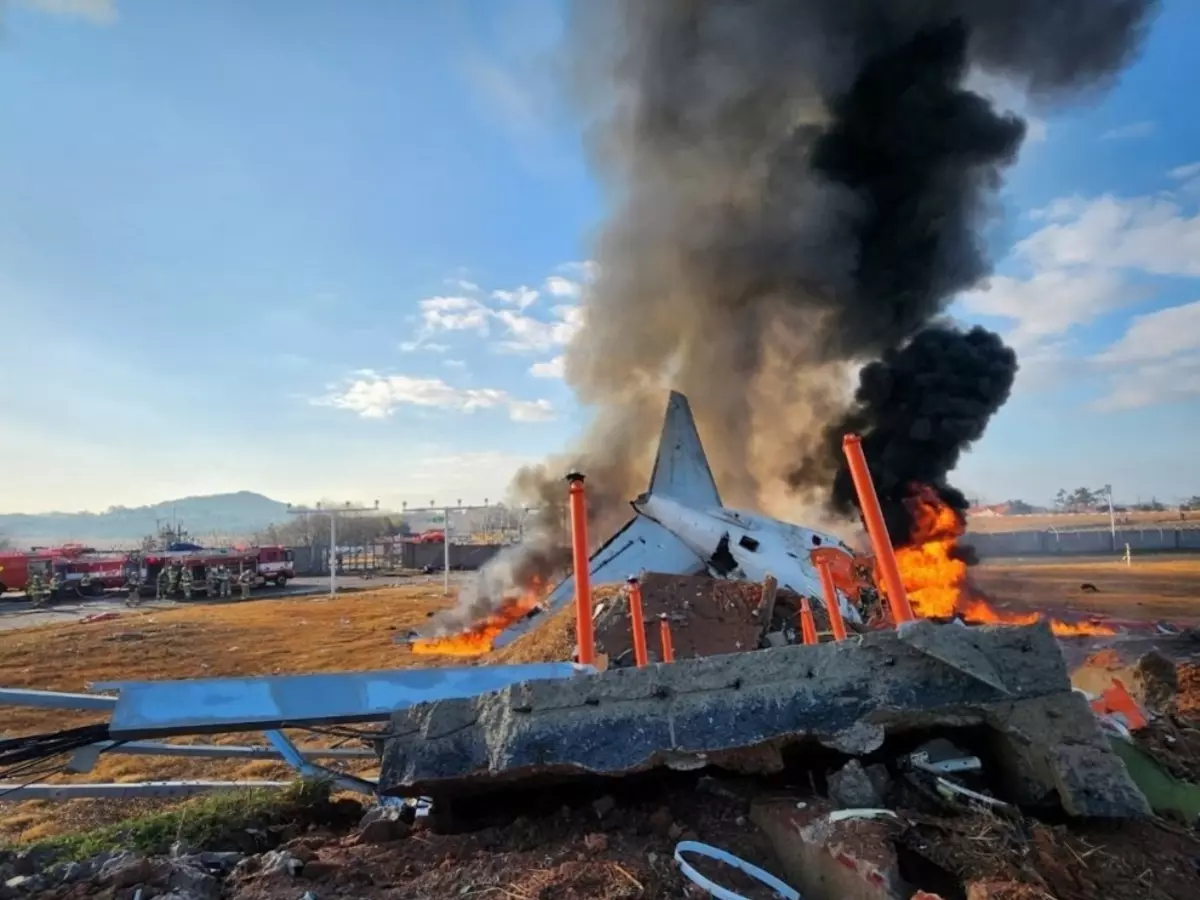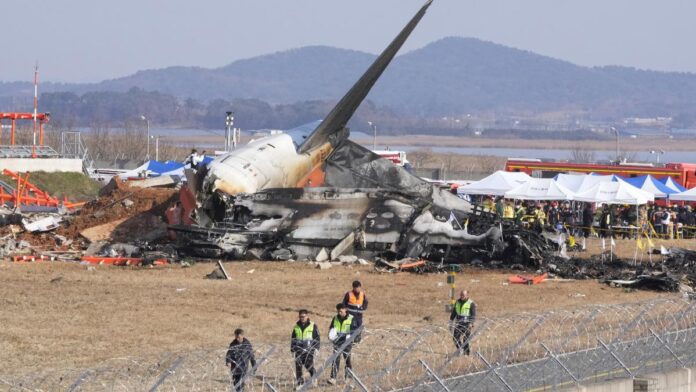A recent update on a plane crash at South Korea’s Muan International Airport reveals that only two people have survived the tragic incident involving Jeju Air flight 7C 2216. The crash, which occurred during an emergency landing early Sunday morning, has claimed the lives of at least 120 passengers, while 59 remain unaccounted for. This catastrophe is one of the deadliest aviation disasters in South Korea’s history.
Details Of The Incident
The Jeju Air flight, a Boeing 737-800, was traveling from Bangkok to Muan International Airport with 175 passengers and six crew members on board. At approximately 9 am local time, the aircraft veered off the runway during its landing, colliding with a concrete wall and erupting into flames.
CCTV footage shared by local media captured the twin-engine jet skidding along the runway without visible landing gear before the crash. Eyewitnesses reported seeing a massive explosion as the plane slammed into the wall.
Among the passengers were two Thai nationals, while the majority were South Korean citizens. The two survivors, reportedly crew members, were rushed to a nearby hospital with moderate to severe injuries.

Family Reactions At The Airport
Relatives of the passengers gathered at Muan airport in the aftermath of the crash, anxiously awaiting updates from authorities. Volunteers from the Red Cross provided blankets and necessities, while officials facilitated communication with family members.
One grieving relative expressed frustration, saying, “I don’t know what’s going on,” as the lack of clear updates added to the emotional turmoil. Another family member pleaded with journalists to maintain decorum, stating, “We are not monkeys in a zoo. We are the bereaved families.”
Jeju Air’s Response And Apology
Jeju Air CEO Kim E-bae publicly apologized to the victims’ families and expressed deep regret over the incident. During a brief media interaction, he assured that the airline prioritizes support for the affected families and fully cooperates with authorities in the ongoing investigation.
Initial reports suggest that the control tower had warned about potential bird strikes before the landing. This revelation has raised questions about the adequacy of the safety measures implemented by both the airline and airport authorities.
Worst Aviation Disaster Since 1997
The crash at Muan International Airport is being compared to the 1997 Korean Air crash in Guam, which claimed over 200 lives. It is now the second-worst aviation disaster involving a South Korean airline and is on track to become the deadliest in the country’s history.
The tragedy has reignited discussions about aviation safety protocols, particularly at smaller regional airports like Muan. Experts are urging the implementation of stricter safety measures to prevent such devastating incidents in the future.

International Condolences And Assistance
The global community has extended its condolences to South Korea in the wake of this tragedy. US Ambassador Philip Goldberg expressed his grief on social media, writing, “My sincerest condolences go out to the victims and their loved ones.” Similarly, Germany’s Ambassador Georg Schmidt shared his heartfelt wishes for the injured and the rescue teams involved.
In a bid to assist grieving families, South Korea’s national rail operator has announced special train services from Seoul to Muan, free of charge. The KTX bullet train service will help families of victims and survivors reach the crash site quickly and without additional financial burden.
Ongoing Investigations Into The Cause
The South Korean transportation ministry has launched a comprehensive investigation to determine the cause of the crash. Key areas of focus include possible mechanical failure, pilot error, and external factors such as bird strikes.
Safety experts have emphasized the need for enhanced aviation protocols, especially for smaller airports that handle both domestic and international flights. The tragic incident has highlighted gaps in emergency preparedness and safety measures that require immediate attention.
Lessons For The Future
This recent update on the plane crash at Muan International Airport underscores the profound impact of aviation disasters. The tragic loss of lives, the grief of the families, and the efforts to uncover the cause of the crash highlight the need for continuous improvements in safety standards.
South Korea must address these concerns to ensure that such plane crashes are not repeated, protecting passengers and restoring confidence in air travel. The ongoing investigation and the global solidarity shown in the wake of this disaster serve as reminders of the critical importance of safety in the aviation industry.

